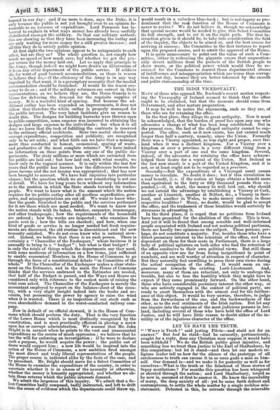THE IRISH VICEROYALTY.
MANY of those who opposed Mr. Roebuck's recent motion respect- ing the Viceroyalty of Ireland seemed to think that the office ought to be abolished, but that the measure should come from Government, and after mature preparation.
It may be well to notice the argument', such as they are, of those who are for retaining the office.
In the first place, they allege its great antiquity. Now it must be acknowledged, that the burden of proof lies upon any one who advocates a change of what has been long established. But in the present case, the fact of the alleged antiquity cannot be sup- ported. The office, such as it now exists, has not existed much longer than half a century, namely, since the Union. Formerly there was a Viceroy appointed, as was right and proper, over Ire- land when it was a distinct kingdom. For a Viceroy over a kingdom or over a province is a very different thing from a Viceroy over a part of one and the same kingdom. Several, indeed, of the advocates for retaining the office have acknow- ledged their desire for a repeal of the Union. But Ireland as the law now stands is a part of the United Kingdom, and it is not, or at least ought not to be regarded as a province. Secondly—But the expenditure of a Viceregal court causes money to circulate. No doubt it does ; but if this circulation be a real benefit, (i. e. if the nation at large obtains a benefit more than equivalent to the forty or fifty thousand pounds thus ex- pended,)—if, in short, the money be well laid out, why should we not extend the advantage by establishing a Viceroy at Cork, another at Limerick, another at Belfast, &c., a Viceroy in Scot- land, and another in Wales, to make money circulate in those respective localities ? Many, no doubt, would be glad to accept the office, and the tradesmen of those localities would certainly be strenuous in advocating it.
In the third place, it is urged that no petitions from Ireland have been presented for the abolition of the office. This is true. And yet it will be found that among sensible and well-informed people acquainted with Ireland and not zealous political partisans, there are hardly two opinions on the subject. These persons, per- haps' do not constitute a majority. For, besides those who have a direct pecuniary interest in the retention of the office, and those dependent on them for their seats in Parliament, there is a large body of political agitators on both sides who find the retention of the office conducive to their own political views. But still those of an opposite view are far from being insignificant in point of numbers, and are well worthy of attention in respect of character. But they naturally feel unwiling to press their own views during the actual occupation of the office. It would seem an un- gracious act towards the existing Lord-Lieutenant. And, moreover, many of them are reluctant, not only to undergo the trouble, but also to face the hostility which they might have to expect if they came prominently forward. On the other hand, those who have considerable pecuniary interest the other way, or who are actively, engaged in the contest of political party, are ready to exert themselves with the utmost zeal for the further- ance of this object. It would be +my unwise, therefore, to judge from the forwardness of the one, and the backwardness of the other, as to the real sentiments of the Irish nation. But let any one inquire into the opinions of the most judicious persons in Ire- land, including several of those who have held the office of Lord Justice, and he will have little reason to doubt either of the in- utility or of the injurious character of the office.


































 Previous page
Previous page